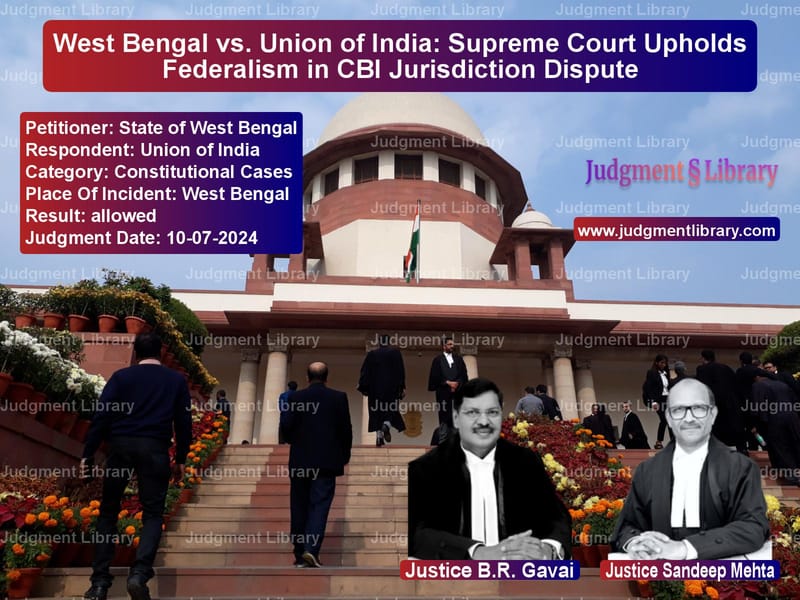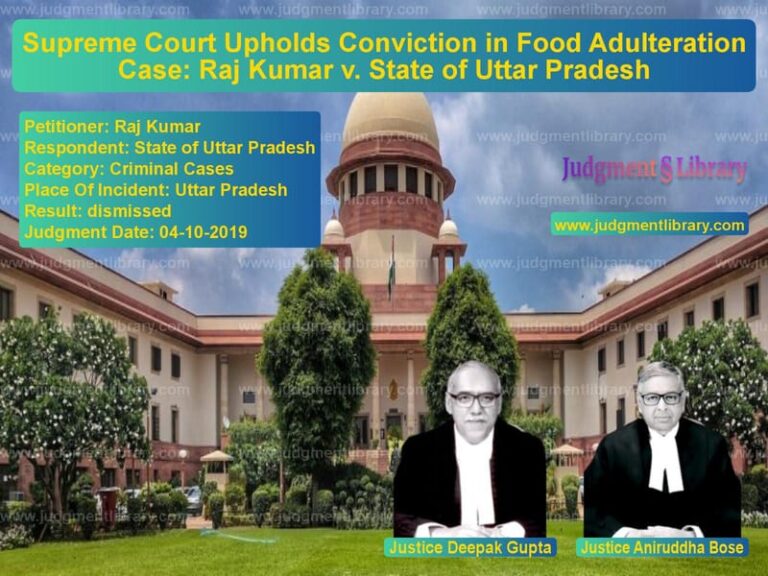West Bengal vs. Union of India: Supreme Court Upholds Federalism in CBI Jurisdiction Dispute
The dispute between the State of West Bengal and the Union of India in Original Suit No. 4 of 2021 before the Supreme Court of India revolves around the withdrawal of consent under Section 6 of the Delhi Special Police Establishment (DSPE) Act, 1946. The case raises fundamental questions about federalism, the autonomy of states in controlling law enforcement, and the extent of the Central Bureau of Investigation’s (CBI) authority in states that have revoked consent.
The State of West Bengal filed the suit challenging the registration of cases by the CBI after withdrawing consent under Section 6 of the DSPE Act. The Supreme Court was called upon to determine whether the Union of India, through the CBI, could continue to exercise investigative powers in the state despite the withdrawal.
Background of the Case
The State of West Bengal, through its legal counsel, Kapil Sibal, Abhishek Manu Singhvi, and Bishwajit Bhattacharya, argued that once consent under Section 6 of the DSPE Act was withdrawn on November 16, 2018, the CBI no longer had jurisdiction to register new cases or conduct investigations in the state.
The State sought relief from the Supreme Court in the form of a declaration that the registration of cases by the CBI in West Bengal after consent withdrawal was unconstitutional. The reliefs sought by the State included:
- A declaration that the registration of cases post-withdrawal of consent was void.
- An injunction restraining the CBI from investigating cases in West Bengal without state consent.
- Quashing of cases registered post-consent withdrawal.
Arguments by the Union of India
The Union of India, represented by Solicitor General Tushar Mehta, raised preliminary objections regarding the maintainability of the suit under Article 131 of the Constitution, which grants the Supreme Court original jurisdiction in disputes between states and the Union.
The key contentions of the Union of India were:
- Article 131 does not apply: The Union argued that since related cases were already being heard under Articles 136 and 226 (appellate and writ jurisdiction), the suit was redundant.
- CBI is independent: The Union contended that the CBI operates independently and is not an extension of the Union Government.
- Prior High Court cases: The Union pointed out that certain CBI cases in West Bengal were initiated based on High Court directives and were thus outside the purview of the state’s consent withdrawal.
Arguments by the State of West Bengal
The State of West Bengal countered these arguments by asserting that:
- The DSPE Act requires state consent: The State argued that Section 6 of the DSPE Act clearly mandates prior consent for CBI jurisdiction in state matters.
- Violation of federal principles: The unauthorized registration of cases by the CBI post-consent withdrawal violated the federal structure, which reserves policing powers to states.
- Judicial precedents support state autonomy: Citing previous rulings, the State emphasized that the CBI cannot bypass the state’s authority unless directed by the judiciary.
Supreme Court’s Observations
The Supreme Court, led by Justices B.R. Gavai and Sandeep Mehta, examined the legal framework governing CBI jurisdiction and the principles of federalism. The Court made the following key observations:
- CBI jurisdiction is subject to state consent: The Court reiterated that under Section 6 of the DSPE Act, the CBI cannot exercise jurisdiction in a state without its explicit approval.
- Federalism is a basic structure of the Constitution: The judgment emphasized that state autonomy over policing is a fundamental tenet of India’s federal system.
- Union cannot override state authority: The Court held that the Union of India could not unilaterally extend CBI jurisdiction without the state’s consent.
- Pending cases under Article 136 do not bar the suit: The Court dismissed the Union’s argument that the suit was untenable due to similar cases being heard under Article 136.
- Judicial directions are an exception: The Court clarified that investigations ordered by the judiciary were exempt from the state’s consent requirement.
Legal Precedents Considered
The Supreme Court referred to multiple judicial precedents while deciding the case:
- State of Bihar v. Union of India (1970): Clarified that disputes under Article 131 must involve only state and union governments.
- State of Rajasthan v. Union of India (1977): Affirmed that states have the locus standi to challenge Union actions encroaching upon their jurisdiction.
- Committee for Protection of Democratic Rights v. State of West Bengal (2010): Stated that High Courts and the Supreme Court can direct the CBI to investigate cases, overriding state consent.
- Subramanian Swamy v. CBI (2014): Reaffirmed that statutory procedures must be followed for CBI jurisdiction.
Conclusion
The Supreme Court dismissed the Union’s preliminary objections and upheld the maintainability of West Bengal’s suit. The ruling reinforced the principle that the CBI requires state consent to operate in non-central matters, unless directed otherwise by the judiciary.
This judgment marks a significant reaffirmation of federalism, ensuring that the central government cannot unilaterally expand the jurisdiction of federal investigative agencies in states that withdraw their consent. It also clarifies the role of the judiciary in resolving disputes related to intergovernmental jurisdiction.
The case is now set for further hearings on substantive issues regarding the validity of CBI actions post-withdrawal of consent.
Petitioner Name: State of West Bengal.Respondent Name: Union of India.Judgment By: Justice B.R. Gavai, Justice Sandeep Mehta.Place Of Incident: West Bengal.Judgment Date: 10-07-2024.
Don’t miss out on the full details! Download the complete judgment in PDF format below and gain valuable insights instantly!
Download Judgment: state-of-west-bengal-vs-union-of-india-supreme-court-of-india-judgment-dated-10-07-2024.pdf
Directly Download Judgment: Directly download this Judgment
See all petitions in Legislative Powers
See all petitions in Constitution Interpretation
See all petitions in Public Interest Litigation
See all petitions in Judgment by B R Gavai
See all petitions in Judgment by Sandeep Mehta
See all petitions in allowed
See all petitions in supreme court of India judgments July 2024
See all petitions in 2024 judgments
See all posts in Constitutional Cases Category
See all allowed petitions in Constitutional Cases Category
See all Dismissed petitions in Constitutional Cases Category
See all partially allowed petitions in Constitutional Cases Category







